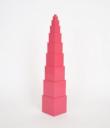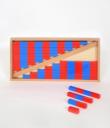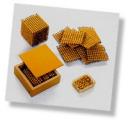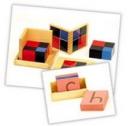In the Montessori classroom, learning materials are arranged invitingly on low, open shelves. Children may choose whatever materials they would like to use and may work for as long as the material holds their interest. When they are finished with each material, they return it to the shelf from which it came.The materials themselves invite activity. There are bright arrays of solid geometric forms, knobbed puzzle maps, colored beads, and various specialized rods and blocks.Each material in a Montessori classroom isolates one quality. In this way, the concept that the child is to discover is isolated. For example, the material known as the pink tower is made up of ten pink cubes of varying sizes. The preschool-aged child constructs a tower with the largest cube on the bottom and the smallest on top. This material isolates the concept of size. The cubes are all the same color and texture; the only difference is their size. Other materials isolate different concepts: color tablets for color, geometry materials for form, and so on.Moreover, the materials are self-correcting. When a piece does not fit or is left over, the child easily perceives the error. There is no need for adult “correction.” The child is able to solve problems independently, building self-confidence, analytical thinking, and the satisfaction that comes from accomplishment.As the child’s exploration continues, the materials interrelate and build upon each other. For example, various relationships can be explored between the pink tower and the broad stair, which are based on matching precise dimensions. Later, in the elementary years, new aspects of some of the materials unfold. When studying volume, for instance, the child may return to the pink tower and discover that its cubes progress incrementally from one cubic centimeter to one cubic decimeter.



